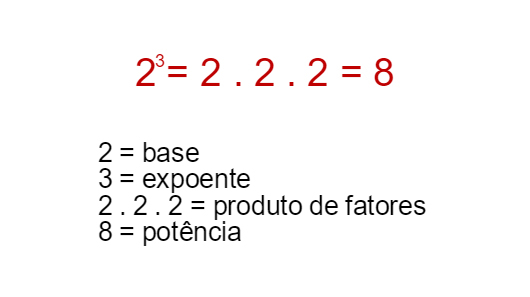Potency is that which has power, strength, vigor and importance. In mathematics, the potency is the result of a number multiplied by itself one or more times..
The first foundations of potentiation were made by the French mathematician Rene Descartes (1596 – 1650).
The base equation of potentiation is TheB = c, where a = base; b = exponent; and c = power.

As seen in the example above, the fact that the exponent is the number 3 means that the base (number 2) must be multiplied three times by itself, so that the power of this equation can be found.
In addition to mathematics, power can be applied to other sciences, such as astronomy, physics, biology and chemistry, for example.
Power properties
Mathematical equations with power can follow some rules that facilitate their resolutions, if they follow any of the following characteristics:
- Product of powers of the same base: when there is a multiplication of two operations with the same base, it remains the same and the exponents are added.
Example: 23. 22 = 25 = 32
- Division of powers of the same base: keep the base and subtract the exponents.
Example: 25 / 22 = 23 = 8
- Power power: exponents are multiplied.
Example: (24)2 = 24.2 = 28
- Power of a product: the general exponent is the exponent of the factors.
Example: (2.4)3 = (23.43)
- Power multiplication with the same exponent: conservation of exponents and multiplication of bases.
Example: 23.53 = (2.5)3
See also: meaning of Logarithm.
Power in Physics
In the field of physics, power corresponds to the speed at which a given work is performed or at which energy is transferred.
Electric power
It consists in the capacity of an energy charge to transform itself into another form of energy in a certain period of time.
The faster the amount of energy transformed in a short period of time, the greater the electrical power of this device, for example.
The electric power equation is:
Pot = Ee / Δt
The unit of the result of this equation is measured in watts (W).
Learn more about energy meaning.

